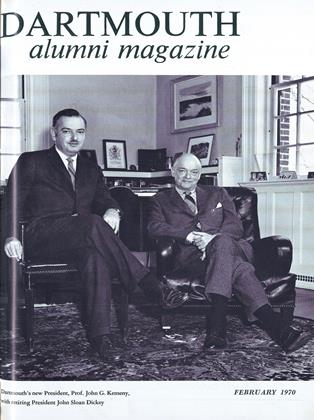OUT OF THE CRACKER BARREL: THE NABISCO STORY, FROM ANIMAL CRACKERS TO ZU ZU'S.
FEBRUARY 1970 ROBERT H. GUESTOUT OF THE CRACKER BARREL: THE NABISCO STORY, FROM ANIMAL CRACKERS TO ZU ZU'S. ROBERT H. GUEST FEBRUARY 1970
By WilliamCahn '34. New York: Simon & Schuster,1969. 367 pp. $8.95.
The average book shopper is likely to yawn his way over a jacket with a Uneeda Biscuit boy and a title that includes Animal Crackers to Zu Zu's. He might recognize that the book is a story of the National Biscuit Company and promptly dismiss it as a public relations rags-to-riches story of just another American business firm.
But let him start to read beyond the first page. He will surely be caught up in a story that is as exciting as it is educational. Let him read about the lawyer-turned-entrepreneur Adolphus W. Green, founder of the National Biscuit Company, whose financial machinations and sense of product innovation easily matched the manipulations of the more famous Carnegies, Goulds, Morgans, and Rockefellers. Here was the prototype of the brilliant, energetic autocrat who, at the turn of the century, amalgamated hundreds of small bakery businesses into one of the great food giants. Its products were to become household words thanks to packaging and advertising techniques that quickly set the pace for many other consumer businesses.
Green's extraordinary successes generated a kind of "great man" dependency that nearly put the Company on the rocks for his successors. True, the Company paid dividends all through the Depression years but, after Green's death, there was lacking the kind of dynamism built into the total management structure that is so essential if a company is to innovate, if it is to respond to the needs of its own employees and to its consuming public. By the end of World War II "the Company faced a dim future. All it had was money. Nobody advanced: nobody retired."
New blood was brought in. Or more accurately, younger men in the Company were given free rein to put into practice what has come to be known as the skills of modern professional management. The analysis of the subsequent success is matched only by William Cahn's own ability to tell about it.
Mr. Guest is Professor of OrganizationalBehavior at the Tuck School.
 View Full Issue
View Full Issue
More From This Issue
-
 Feature
FeatureFrom the Primate Patrimony To the Fellowship of Flowers
February 1970 By JAMES W. FERNANDEZ, -
 Feature
FeatureThe Pros and Cons of Coeducation
February 1970 -
 Feature
FeatureSpeaking of Books
February 1970 By FRANCIS BROWN '25, -
 Feature
FeaturePROF. JOHN G. KEMENY CHOSEN AS DARTMOUTH'S 13TH PRESIDENT
February 1970 -
 Article
ArticleThe Undergraduate Chair
February 1970 By WINTHROP A. ROCKWELL '70 -
 Class Notes
Class Notes1918
February 1970 By EDMUND H. BOOTH, DONALD L. BARR
ROBERT H. GUEST
Books
-
 Books
BooksFACULTY PUBLICATIONS
February 1916 -
 Books
BooksTHE RETURN OF ADAM SMITH
April 1950 By Bruce W. Knight -
 Books
BooksPOSSLQs
MAY 1982 By Gary T. Brooks '70 -
 Books
BooksTHE STORY OF SAN MICHELE
January, 1930 By H. E. West -
 Books
BooksKate Sanborn, July 11, 1839 - July 9, 1917
November 1918 By J.K.L. -
 Books
BooksFLAUBERT IN EGYPT: A SENSIBILITY ON TOUR. A NARRATIVE DRAWN FROM GUSTAVE FLAUBERT'S TRAVEL NOTES & LETTERS
December 1973 By JOHN HURD '21




